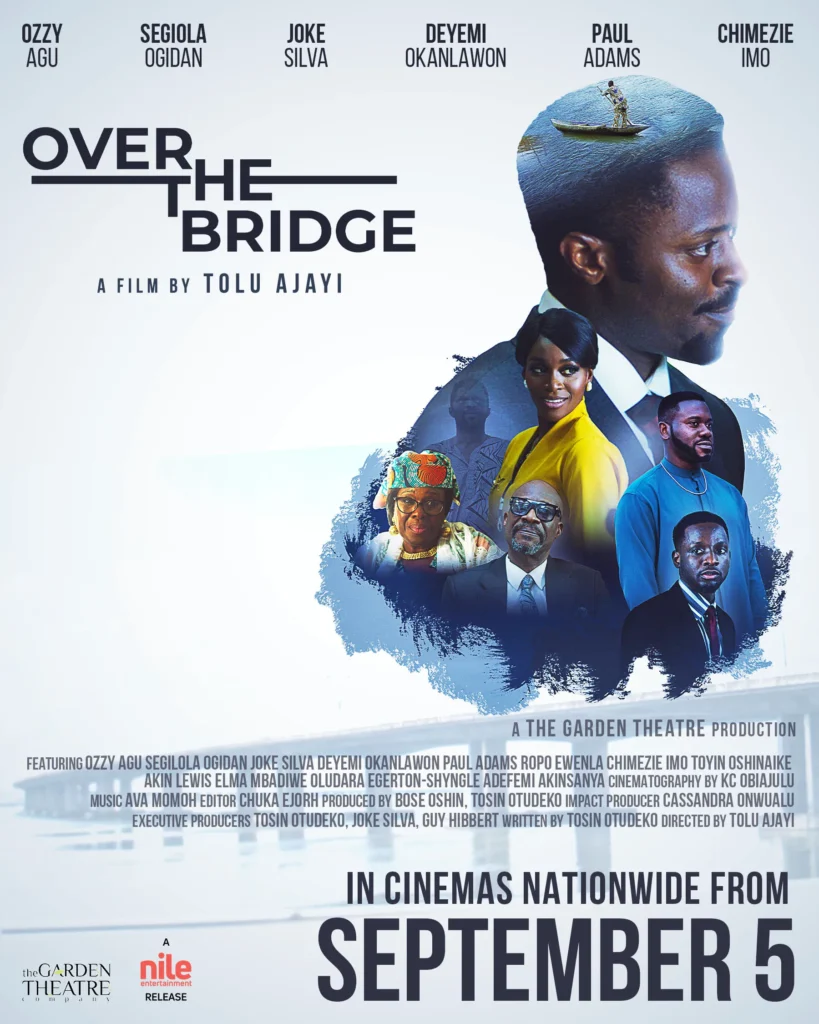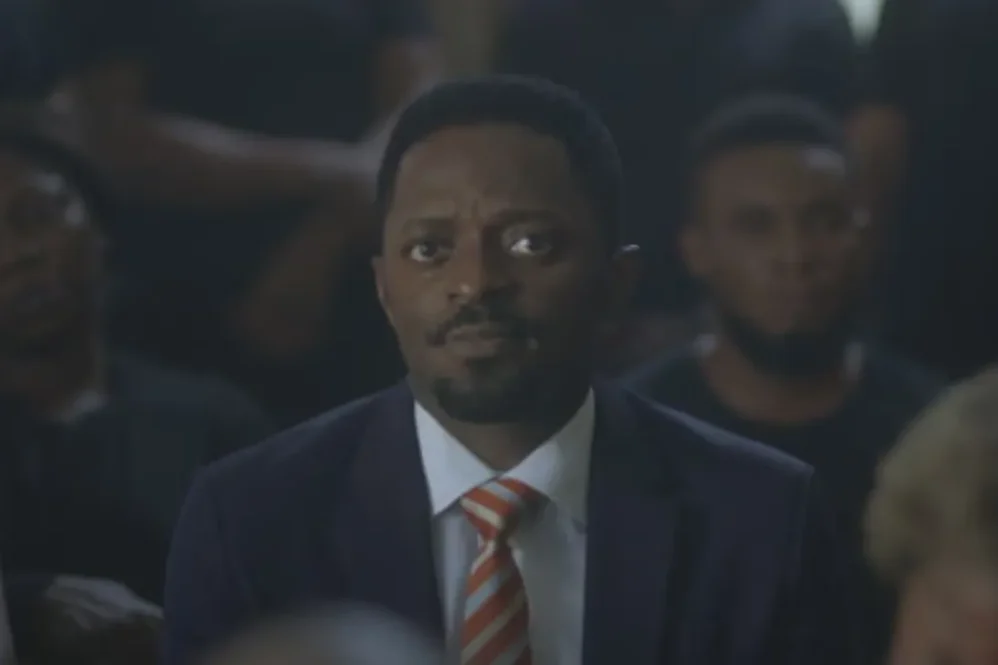Everyone speaks in Tolu Ajayi’s Over the Bridge: the characters with their voices, and the rivers, the fishes, the music with their own voice. No direct communication passes between them, yet meaning emerges all the same. It is interesting to find these elements carry the same emotional freight that generally serves the film’s plot and mood. Light across water, the tilt of a boat hull, metaphors for casting nets into the deepest part of water, the static hum of the city. All of these speak what our lead, Folarin, cannot articulate, what the viewers cannot entirely predict.

(Click to Follow the What Kept Me Up channel on WhatsApp)
The story is about Folarin (Ozzy Agu), a banker whose much-awaited Lagos infrastructure project becomes less a corporate scandal than a personal implosion. Around him, underhanded deals nibble at the margins of professional integrity. His protégé, Kevin (Chimezie Imo in an affecting role), finds himself caught in the mess of the project—thanks to Folarin’s ambitions—and the weight of it presses hard on Folarin’s conscience.
Guilt eats Folarin up completely. This guilt is made alive through wounds that live even in how Folarin stares too long at his glass of water, or his inability to take a long sit. These are the events, yes, but director Ajayi is less concerned with the surface scandal and more with how it caves Folarin inward.
On the surface, it is the familiar Nollywood terrain of corruption and scandal. But Ajayi doesn’t do it the easy way; he chooses not to drown us in exposition or boardroom shouting matches or courtroom speeches. He instead builds a film that unfolds with stillness and absence—of the mind, of self, of things. Folarin at his desk, eyes fixed on numbers that have ceased to mean anything; his wife (Segilola Ogidan) watching him recede further into himself, her own grief hidden behind a brave calm. And then the return of memory. One such return is of a heated argument she has with Folarin on why he’s no longer interested in trying for a child. “I’m tired,” Folarin counters. And perhaps it is this tiredness to fit into certain societal expectations that further estranges Folarin over the bridge that demarcates reality from illusion.
Over the Bridge might imply absence, but Folarin’s mind is present everywhere and survives a good portion of the film, louder and clearer, visual and compelling. At a press conference, for example, when Folarin is being interviewed, a traditional man appears amongst the crowd, and next we find him outside, looking for that man. In another, the traditional man asks him not to forget the indigenous owners of the land where the project would be built.
All of these contribute to build that very mood. Even the supposed accident—Folarin’s disappearance on his birthday, his car found atop the bridge—is staged as a mystery, carrying the exact same mood one could tell Ajayi was intent on exploring with this film. We don’t see the fall. But like his wife, we believe that he hasn’t gone too far, that he didn’t let himself over the bridge. We live with the hope in her voice as she tells a friend, Kunle (Deyemi Okanlawon) that Folarin might be unpredictable, but that he’s also not one to take his own life.
The puzzle, however, is that there is a river. And there is a rescue.
Rescued by a fisherman—one quickly thinks of an old farmer or fisherman rescue-of-the-lost tales we grew upon as children here in Nigeria—nursed back to health in a coastal village, Folarin drifts into what feels like hallucination. The painted boats, the tide, the musical chords, they are actors in their own right, speaking their own language.
In Ajayi’s film, the sea is a mirror: fluid, elusive, ungraspable, like Folarin’s own memory. But this is also where the film slips. His amnesiac stay with the villagers, his cold reception by the chiefs, his fleeting meeting with the figure from his dreams—these fragments feel impressionistic, yes, but not tightly woven enough. One should expect, for example, a deeper confrontation with the man of his dreams—the village leader—other than the simple, rather too convenient dialogue that ensues between them and Folarin suddenly gaining his memory. There should be a more serious reason why the village is not welcoming to strangers, but this information is lacking. All Folarin’s rescuer tells him is, “You go dey follow us dey go fish. These village people, dem no like visitors for here.” One is only left to guess that perhaps they resist because the powers that be threaten to displace them. That reading isn’t impossible, but stories, even impressionistic ones, ought to find ways of tying their loose ends, however subtly.
There’s also the consideration that these are the sort of melodramatic arcs Nollywood has overindulged before. Think of the countless films where memory loss is a convenient device, often played for overwrought tears or improbable revelations, the story collapsing under its own emotional excess. It also brings to mind the very popular Philippine soap operas that used to crowd film shops only some years ago. One can almost feel Over the Bridge drifting toward that familiar territory.
Yet Ajayi shows skillfulness in not surrendering to cliché. He shoots these passages with restraint, letting muted colour palettes and the still voice of nature do the heavy lifting. Agu’s performance follows suit. His despair lingers, not in dramatic collapses but in the subtle dimming of his voice, the hesitation before he recognises his own reflection. Where another Nollywood production might have milked the fisherman’s rescue for melodrama, Ajayi pares it down to suggestion and mood. What could have dissolved into excess instead becomes uneasy poetry, moments of sincerity salvaged from the edges of tradition.
This is Ajayi’s first feature, but it carries the assurance of someone who’s been at it far longer. He isn’t new to filmmaking, after all. His credits include directing Showmax series Princess on a Hill, which also dabbles in the corporate world, and a stint as episode director on Diiche. For the most part, though, he’s worked in shorts, a form he has over the years built a name around. That background matters, as one would find that they can feel in this debut the precision of a short filmmaker stretching into longer form, sometimes elegantly, sometimes with seams showing.
Over the Bridge is less about answers than about atmospheres, which on its own, earns the film just enough stars for its sustenance of a mood and of stillness—in story and atmosphere. Ajayi does not give us a story of scandal or even redemption, but of a portrait of a man undone by ambition and remade, however tentatively, by the textures of absence.
Over the Bridge premiered in cinemas on September 5.
Become a patron: To support our in-depth and critical coverage—become a Patron today!
Join the conversation: Share your thoughts in the comments section or on our social media accounts.
Side Musings
- Folarin’s “Where am I?” when he found himself in the small fishing village on crutches deserves a Nollywood Hall of Fame nomination. Somewhere between Hamlet and NTA soap opera.
- The painted boats deserve a credit line. Honestly, they act harder than some supporting cast in recent cinema.
- At some point, I wondered if the village elders were going to offer Folarin as a sacrifice to their gods. That would have been the most Nigerian resolution.



